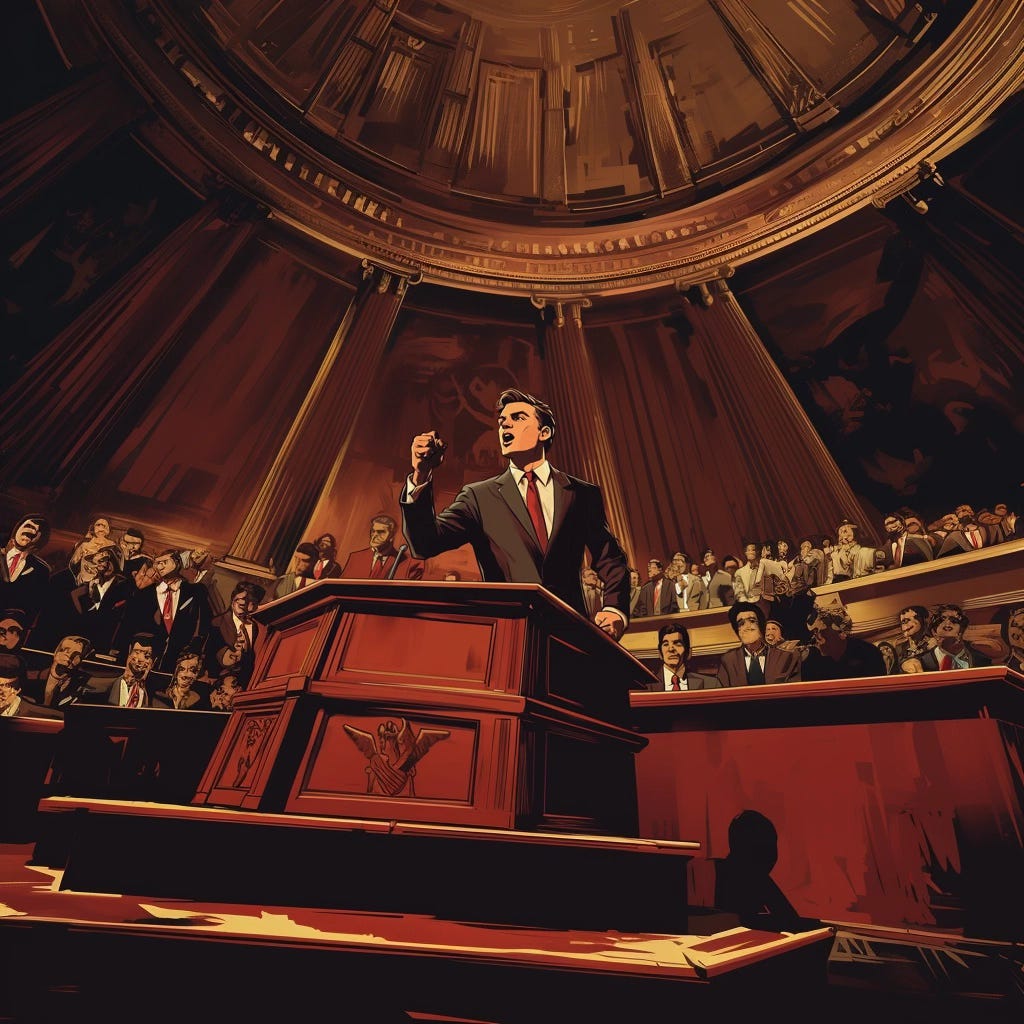5 Classic Movies That Desperately Need a Modern Makeover
We need more films that challenge the status quo—remakes of these 5 classics could do just that.
This is the last Friday before Halloween, so I will take a beat to explore one of my favorite things, movies, and their power to shape how we see the world. It comes up because when it gets to 31 October, I’m planning to take a couple of hours for myself to sit and watch The Shining, again. I will probably also watch some analysis from my favorite movie thinker at Collative Learning, in between answering the door to trick or treating kids, since that is (thank whatever part of the universe needs thanking) still a thing.
Unfortunately, it’s no secret that movies have been going through a real rough patch these last few years. While the industry took a sharp hit during COVID, the influence of identity politics started long before that, most notably following the #OscarsSoWhite controversy. Since that time, Hollywood has been busy making sure all the diversity boxes are checked, to the extent that there literally are checklists.
It’s fair to say that it’s up in the air as to whether Hollywood will manage to save itself or not, much less become a beacon that can help the West collectively remember who we are and the great about that. But that doesn’t mean that a handful of enterprising upstarts can’t pull it off!
In fact, for those readers in California and other ideologically captured states, finding ways to be artistically subversive may be the best way to make your voices heard even if you have to do so anonymously.
This in mind, here are five movies that I think are ripe for modern indie remakes.
Based on the 1940 novel by Walter Van Tilburg Clark. The Ox-bow Incident is a Western that tells the story of mob justice that gets it wrong. When a local is reported murdered, a group of neighbors form a posse that intends to find the killer. When the group captures 3 strangers, they assume they have found the killers. The posse ignores the strangers’ story of being new homesteaders and, they hang the three men, only to later find out everything they said was true. If that’s not bad enough they also learn the local who was reported murdered is very much alive.
Timely Themes - The importance of Due Process - If there is one thing the U.S. Justice system got right, it is an emphasis on the controlled and measured examination of evidence before taking action. Short of retelling the story of the crucifixion of Jesus, this movie does a great job of showing the terrifying reality of mobbing and how that can quickly lead to disaster.
The danger of groupthink - This movie also shows how individuals can get caught up following the crowd. While there are a few who express doubt, their voices are drowned out and the mob goes through with the hanging.
Adjustments for Current Times - There is no shortage of ways this movie could be translated to fit into modern circumstances, but if I was rewriting the script, I’d love to see this tied into modern online cancelling. Dramatizing just how painful that can be would resonate with everyone out there who has been cancelled or fears it. It would also hold a mirror up to the self-righteous cancellers. Preserving some moral ambiguity would be ideal, and would prevent a remake from sliding into polemic territory, though you could also argue a polemic stance is called for.
Treading similar ground, The Crucible tells the story of the Salem witch trials and in particular follows the story of John Proctor and his relationship with one of the teen girls that claim to be tormented by the devil.
The Crucible goes into more detail about how the legal system can be weaponized by false accusations when people have ulterior motives, be they deflecting attention from the accusers’ own wrongdoing, or with the intent of providing the accuser the opportunity to get something they want, be it a parcel of land or someone else’s husband.
Timely Themes - Moral Panics -Fear-based decisions rarely lead to ideal outcomes. If acting from a place of logic and reason has one huge benefit it is that it limits the influence of fear in our decisions.
Mob Hysteria destroys relationships The big revelation from The Crucible is that it highlights how friends and family can turn on each other when caught up in a moral panic. This is a painful reality that few want to view head-on, but it is all the more reason to find ways to thwart the human tendency to form mobs.
The more people can internalize the idea that unbridled emotions can lead to disastrous outcomes, the more we have the wisdom to appreciate things like due process, empirical evidence, and the dangers of hearsay and anonymous testimony.
The value of courage and integrity The example of the townsfolk who refused to confess to witchcraft despite being tortured is a wake-up call for what’s really important. Life may put us in circumstances where sacrifice is required. When we delay confronting the problems we face, they tend to mushroom.
Adjustments for Current Times - It would be interesting to see this story translated to the modern workplace, or Hollywood itself. Current events have shown that the arts are particularly vulnerable to political witch hunts. Exploring that in more depth would be fertile ground.
This science fiction cult classic features a drifter who learns the world has been infiltrated by an alien invasion. After he acquires a pair of sunglasses that allow him to see reality as it really is his eyes are opened. Not only does he see the aliens in their true form, but he also sees the underlying messages in advertising and other ways those in power manipulate the populace. The contrast between the drifter’s hardscrabble life and the well-positioned aliens makes for stark social commentary.
Timely Themes - Hidden Power Structures - Now that the truth of President Biden’s cognitive decline is common knowledge, and the efforts of his staff and the media to cover it up are undeniable, many have been rightly asking–who is in charge? As long as these questions are being dodged, subversive storytelling has a duty to press the issue.
Rejecting Conformity - Once the protagonist sees the truth he has a choice to remove the glasses and go back to his old life or fight even though the odds seem grim. Celebrating efforts to go against the grain reinforces the value of courage.
Collective Blindness to Destructive Forces – Throughout the movie, the protagonist uses the sunglasses to help others see what’s happening right in front of their faces. Today, with the use of Trojan horse terms, Social Justice ideology has been able to sweep through institutions with no one putting up a fight. Most didn’t even notice until long after multiple public sectors were captured. History will struggle to explain the dynamics that allowed this to happen for decades to come, but current films should start making this vulnerability plain immediately.
Adjustment for Current Times – Dwayne Johnson would make the obvious and hilarious choice for the main character Nada. But aside from better special effects, acting, and all-round bigger budget quality, the most important major tweak would be adjusting the portrayal of the aliens to include some texture. The divide between good and bad mustn’t be totally black and white. Not only would this make the story better, but it also avoids the trap of suggesting these social dynamics are simplistic because they’re not.
This movie follows the journey of a naive young man who is tapped to be Senator. The powers that be believe he will be easily manipulated by his corrupt counterparts. Initially taken in by their manipulations, Mr Smith tries to save his reputation with a 25 hour filibuster but is unsuccessful against the entrenched political players aligned against him. Facing despair Mr Smith collapses, but the main manipulator is struck with guilt and confesses everything, saving Mr. Smith’s reputation.
Timely Themes - How government and lawmaking work – People learn and retain information best when it is connected to stories. Our educational system has been an utter failure at communicating how the American governmental system works, both the good and the bad. But well-made film has long been an effective vehicle for illustrating the drama and importance of otherwise dry processes.
The Power of the Everyman – The main character is an ordinary man, trying to do what he believes is right. He quickly gets in over his head, but he doesn’t quit. Ultimately he does make a difference through his earnest example. Today many people have lost touch with the process of how government works, and have come to believe that they are powerless to change things. Perceived powerlessness makes people apathetic toward the system. An apathetic populace makes tyranny more likely to take hold. While the original film ended on an ambiguous and unbelievable note, a modern remake could use real-life stories of legislators who take their role in Congress as one of service. Many have successfully made a difference. And that would not preclude being realistic on genuine challenges inherent in politics and simply trying to make effective legislation.
The Importance of Free Speech and Debate – The original film shows how quickly our right to free speech and freedom of the press can be suppressed. Today recent revelations of government pressure are horrifying. It is also crazy easy to do with tweaks to algorithms.
Adjustments for Current Times –Where to begin?! The internet has changed the world and we are in the early throes of learning how to grapple with the power and pitfalls it brings to our republic. With AI coming in hot right behind the internet, there are so many issues that will have to be accommodated, learning to maintain freedom in governance will be the challenge of our time. There is no end to the potential drama. Good filmmakers and writers need only get started. However, as they close in on the ending, something more nuanced would be far more honest, and in a way more optimistic. Fantasy is all well and good, but it is understanding reality that gives people real power.
I hate the idea of bringing more bad memories to the doorsteps of my Jewish friends, and it seems especially awful as Israel is fighting to protect its country and defend the notion that it has every right to do so. At the same time, what makes this movie worth remaking, is that it tells the story of how the ACLU fought for free speech in the kind of case where it matters. The plot follows the true story of the legal machinations of a neo-Nazi group to have a rally in a neighborhood of Holocaust survivors.
Timely Themes –Free Speech – This is the entire reason for this movie. It is a reminder that the right to free speech is not about protecting things we want to hear, it is about preserving the right to say the unpopular and the hateful. Having a right to free speech comes with the responsibility of tolerating the worst that others can verbally throw at you (short of specific slander or libel).
Freedoms aren’t always comfy. Sometimes they can be scary and they demand a maturity that may be hard to muster. But the trade-off is silence and unfettered tyranny. There is no need to make adjustments to this story because it’s true. It simply needs to be remembered.
To be sure, there are other films that can be made and other titles that are worth remaking, as we muddle through the transition to an AI and internet-empowered future. However, if we are to retain our Republic and the individual rights that have made the U.S. a place where people are willing to make sacrifices just to reach our shores, we need to attend to the stories we are telling each other about ourselves.
We don’t need propaganda, arguably we are drowning in that right now, but we do need to preserve the wisdom that has made our current lives possible. From The Ox-bow Incidence to Skokie, all these films reflect the beliefs and knowledge that helped us build a country with amazing ingenuity out of nothing in just a handful of generations. The planet has never seen its equal, and the fortunes of the world have all grown with the West’s discoveries and innovations. That’s worth preserving. Nevertheless, there has never been a guarantee that any one of us will have an easy life, and if we want to keep things like our ability to speak our minds freely, it is worth remembering freedom doesn’t come for free.
Housekeeping
My little dog is still recovering from the pitbull attack almost exactly three weeks ago today. She’s had her stitches out, but there remains a patch of skin on her back that needs debridement. So she will be in the cone a good bit longer and going back to the vet…again.
She is well enough that she’s returned to our walks, but between the police handling of the murderer on the loose and the potential for future dog attack, seriously you never know, I’m being a lot more protective.
I continue to curtail my schedule to tend to her as she heals. So forgive me if my diction suffers.
On the Bookshelf
Legislative documents, and records. Still again working on the same two books as before. Lord have mercy… this is embarrassing!
Help Keep This Conversation Going!
Share this post on social media–it costs nothing but helps a lot.
Want more perks? Subscribe to get full access to the article archive.
Pledge to get video and chatroom starting in November 2024.
Support from readers like you keeps this project alive!
Diogenes in Exile is reader-supported. If you find value in this work, please consider becoming a pledging/paid subscriber, donating to my GiveSendgo, or buying Thought Criminal merch. I’m putting everything on the line to bring this to you because I think it is just that important, but if you can, I need your help to keep this mission alive. Even something small can make a big difference.
Already a Premium subscriber? Share your thoughts in the chat room.
About
Diogenes in Exile began after I returned to grad school to pursue a Clinical Mental Health Counseling master’s degree at the University of Tennessee. What I encountered, however, was a program deeply entrenched in Critical Theories ideology. During my time there, I experienced significant resistance, particularly for my Buddhist practice, which was labeled as invalidating to other identities. After careful reflection, I chose to leave the program, believing the curriculum being taught would ultimately harm clients and lead to unethical practices in the field.
Since then, I’ve dedicated myself to investigating, writing, and speaking out about the troubling direction of psychology, higher education, and other institutions that seem to have lost their way. When I’m not working on these issues, you’ll find me in the garden, creating art, walking my dog, or guiding my kids toward adulthood.
You can also find my work at Minding the Campus









